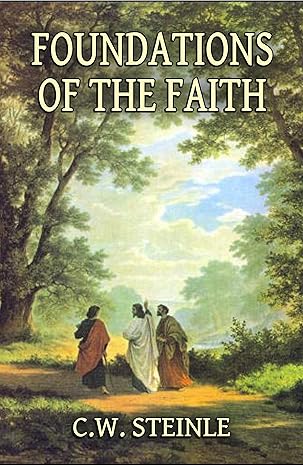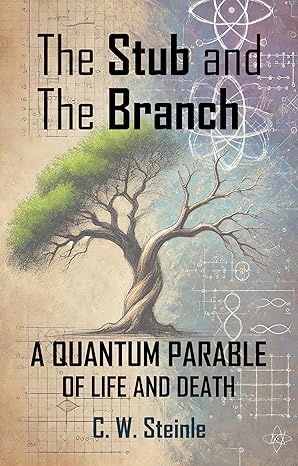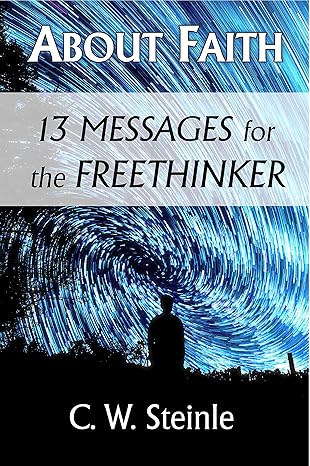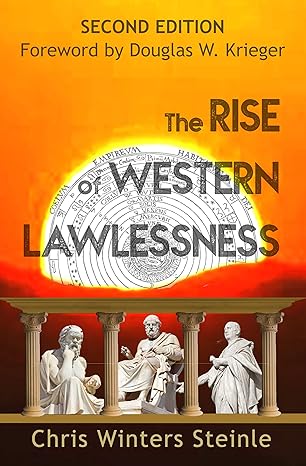SAMPLE CHAPTER from ALBATROSS
One of my favorite chapters of Albatross paints two thought provoking pictures: comparing a juggler to a "super-juggler," and the baseball image of "throwing the cover off the ball."
These illustrations demand consideration of the realities that must be met head-on when contemplating the creation of planet earth. We often picture creation as sort of "still life" setting. Nothing could be farther from the truth.
Enjoy this free reading sample!
ALBATROSS
Faith, Science, and the Future
by C.W. Steinle
Copyright © 2025 Memorial Crown Press
All rights reserved. No part of this book may be reproduced, stored in a retrieval system, or transmitted in any form or by any means—electronic, mechanical, photocopying, recording, or otherwise—without prior written permission from the publisher, except in the case of brief quotations used in critical articles or reviews.
Chapter Twelve: Time and Creation
The man beneath the two skies looked up and wondered not only what the heavens declared, but when they had begun to speak.
For time itself seemed to stretch without edge or anchor. The stars above told stories in light-years, their glow beginning its journey across space long before the first human stood on the earth to see it. The rocks beneath his feet spoke in ages—strata laid down in fire and flood, fossils pressed between layers older than imagination. The physicists told of cosmic background radiation, an echo from the birth of the universe itself, nearly fourteen billion years ago.
The opening chapter of Genesis is a symphony of creation: light and darkness, sea and sky, land and life, sun and moon, stars and seasons, all rising at the word of God. Its refrain—“and there was evening, and there was morning”—beats like a drum between each act. For the Creator, to speak is to accomplish; His word is deed, His command reality. Yet, the “days” of Genesis may measure not hours but order, not chronology but liturgy—the pacing of a cosmic temple being built for the glory of God.
Others have read them as literal days, defending a young earth only thousands of years old. For them, geology is explained by catastrophe, fossils by flood, the speed of light itself perhaps altered to fit the timeline. The world, they insist is not older than Adam by more than a few rotations of the sun.
But the universe itself seems to argue otherwise.
Astronomy stretches human imagination to the breaking point. Light travels nearly six trillion miles in a single year, yet we see galaxies whose light began its journey millions—even billions—of years ago. Geology speaks of ages before ages: continents drifting, mountains rising, oceans carving valleys through stone laid down in forgotten epochs.
As the man looked up at the stars, he realized he was watching a ballet on a galactic scale. As the universe has expanded over the last 13.8 billion years, the regions of space that emitted the light we now see have moved farther away. This means that objects whose light left 13.8 billion years ago are now much more distant. A calculation based on the standard cosmological model (known as Lambda-CDM) shows that these objects are now at a "comoving distance" of about 46.5 billion light-years from us. The calculation is based on data collected by major space-based and ground-based observatories and is constantly being refined.
- Planck Satellite (ESA): The Planck mission, which operated from 2009 to 2013, provided the most precise all-sky map of the cosmic microwave background (CMB) to date. The data released by the Planck team in 2013 and 2015 refined the age of the universe and the values of the cosmological parameters used to calculate its size. (See explanation of CMB that follows.)
- Wilkinson Microwave Anisotropy Probe (WMAP): Before Planck, NASA's WMAP mission produced detailed full-sky maps of the CMB's temperature variations.
- Hubble and James Webb Space Telescopes: These telescopes use multiple methods to measure distances and redshifts of galaxies, which inform our understanding of cosmic expansion.
This ballet of movement is observed using geometrical calculations considering various parallax angles of view.[2] Gravity supplies the inward pull; motion supplies the outward inertia; and the result is a cosmos where orbits persist for eons because moving masses follow curved paths under gravity’s pull (inertia vs. gravity in balance). Earth itself was made to move: it spins, it circles the Sun, the Sun sweeps around the Milky Way, and our whole neighborhood drifts through the cosmos relative to the primordial afterglow of creation—the cosmic microwave background (CMB). At the equator, Earth’s spin is about 1,037 mph; at Phoenix’s latitude it’s ~865 mph.
From the moment scientists discovered it in 1965, the Cosmic Microwave Background has been regarded as one of the most important clues to the origin and structure of the universe. It is sometimes called the “afterglow” of the Big Bang, the faint whisper of radiation that fills all of space like the dying embers of a once-roaring fire. Roughly 380,000 years after the Big Bang, when the young cosmos had expanded and cooled enough for electrons and protons to combine into neutral atoms, the fog of scattering particles cleared. For the first time, photons—the particles of light—could travel freely across space. The radiation released at that moment has been racing outward ever since, stretched by cosmic expansion until today it shines not in visible light but in microwaves at a temperature of 2.73 Kelvin (minus 454.8° Fahrenheit), just a few degrees above absolute zero.
To modern cosmology, this thin bath of microwaves is much more than an exotic curiosity. It is a cosmic landmark, a remnant from the earliest observable era of the universe, and one of the most precise tools we have for studying both the history and the motion of the cosmos itself. When satellites like COBE, WMAP, and Planck mapped the sky in exquisite detail, they found the CMB to be astonishingly uniform, the same in every direction to one part in 100,000. Yet there was a subtle pattern: a tiny rise in temperature on one side of the sky and a tiny dip on the other.
This “dipole anisotropy,” as it came to be called, could be explained very simply. If you are at rest with respect to the expanding universe, the CMB should look the same in every direction—no side hotter or colder than any other. But if you are moving relative to that cosmic frame, the photons ahead of you get compressed by your motion, their wavelengths shortened, making them appear slightly hotter. Those behind you, by contrast, are stretched and cooled. The result is a faint hot-cold pattern across the sky, a kind of cosmic Doppler shift that directly reveals your speed relative to the universe itself.
Careful measurements show that our Solar System is moving at about 369 kilometres per second relative to this universal rest frame defined by the CMB. The direction of this motion points roughly toward the constellation Leo, reflecting not only Earth’s orbit around the Sun but the Sun’s own orbit around the center of the Milky Way, the Milky Way’s motion toward the Andromeda galaxy, and the entire Local Group of galaxies moving through the larger cosmic web. Layer by layer, when astronomers correct for these known motions, what remains is the net velocity of our whole galactic neighbourhood through the expanding universe itself.
The CMB frame has thus become the closest thing modern cosmology has to a “preferred frame of reference”—not in the sense of overturning Einstein’s relativity, for the laws of physics remain the same everywhere, but as a practical benchmark tied to the universe’s own birth. It anchors our measurements of large-scale structure, galaxy flows, and cosmic expansion, providing a backdrop against which the drama of cosmic motion unfolds.
One might picture it this way: imagine a vast swimming pool filled with millions of ping-pong balls bobbing on the surface. In the frame of the pool itself, the balls drift randomly, no side favored over any other. But if you begin swimming through the pool, balls in front of you come thicker and faster; those behind thin out. The CMB behaves in just this way, its nearly uniform glow betraying our motion through space not by any single point of light, but by a universal, all-encompassing shift in temperature from one horizon to the other.
As instruments grew ever more sensitive—from the early COBE maps in the 1990s to WMAP in the 2000s and finally Planck’s stunning full-sky survey in 2013—the precision of these measurements improved dramatically. Modern results even account for the way our motion subtly aberrates the small-scale fluctuations themselves, a cross-check confirming the reality of the speed we measure. Far from being a mere curiosity, the dipole in the CMB has become one of the most solidly established facts in cosmology, a reminder that our Earth, Sun, and galaxy are all carried along in the vast river of cosmic expansion.
For those wanting to explore further, excellent introductions can be found in the Planck Collaboration’s 2013 paper “Doppler boosting of the CMB: Eppur si muove” (arXiv:1303.5087), the standard Planck 2018 results published in Astronomy & Astrophysics, and countless summaries in modern cosmology textbooks and reviews. Together, they show how a faint whisper from the dawn of time became a measuring stick for the motion of galaxies themselves—and for our own small place in the moving, restless universe.
The cleanest single answer is the CMB rest frame—defined by the tiny hot-cold dipole in the microwave background. That dipole tells us the Solar System’s barycenter is moving ~369.8 km/s (~827,700 mph) relative to the CMB.
Layer Earth’s own orbital motion on top of that and you get a seasonal swing: when Earth’s orbital velocity (~29.8 km/s; ~66,600 mph) happens to align with the CMB vector, our speed in that frame is higher; when it’s opposite, lower—roughly ~761,000 to ~894,000 mph over the year. (Daily rotation nudges that by only ~1,000 mph, negligible at this scale.)
It is not necessary to add the Sun’s galactic speed on top of the CMB speed. The CMB number already includes the Sun’s ~220–225 km/s (~490,000–503,000 mph) orbit about the Milky Way, plus our Local Group’s other tugs. Adding them again would double-count.
For context, our Local Group’s barycenter itself moves ~620–627 km/s (~1.4 million mph) relative to the CMB, roughly toward the Hydra–Centaurus “Great Attractor” region. That’s our peculiar motion atop the general expansion of space.
In regard to the concept of “moving away from the Big Bang”: space has no central point of expansion. Galaxies recede from each other according to Hubble’s law; we are not flying away from a single location. Quoting speeds in the CMB frame is therefore the standard, unambiguous way to say how fast we’re moving through the universe.
- While cosmology describes a gradual assembly, nothing in the observed dynamics (the speeds and balances above) contradicts the idea that masses and motions could have been set coherently at once; rather, the data show what combinations are required for stability.
- Physical statement (neutral): Long-lived orbits require the right combination of mass distribution and initial velocities; the Sun–Earth system and the Milky Way plainly have those conditions. In standard cosmology, such conditions emerge via gravitational collapse and structure formation over time.
Picture a street performer beneath the open sky, tossing three balls—catch, toss, catch, toss—each motion depending on the one before. That is creation as sequence: God speaks, light dawns; He speaks again, sky and sea divide; He speaks once more, and land rises from the deep. The beauty lies in the timing—order revealed step by step, like a master artisan laying brushstrokes on a canvas or a teacher turning pages for eager students.
Now imagine another performer, a super-juggler of impossible skill. With one fluid motion, he sends every ball into the air at precisely the right speed, height, and angle. Their paths are perfectly coordinated, so when they reach their first peaks and begin to fall, his hands are already moving in flawless rhythm. From the very first moment, the whole performance works because the patterns were set in motion all at once.
One image shows God as Teacher—the week of creation unfolding like a lesson plan, each day declaring its purpose and culminating in Sabbath rest. The other shows God as Sovereign Composer—a universe so well-scored from the first instant that the entire cosmic symphony plays in perfect harmony as soon as the curtain rises. Both pictures are biblical; both magnify His wisdom. But they invite us to ponder different aspects of His creative genius: ordered progression on one hand, instantaneous coherence on the other.
Baseball fans know the phrase “throwing the cover off the ball,” the image of a pitch launched with such force that it seems to tear itself apart. Now imagine the reverse: a ball held motionless in mid-air and then, suddenly, fired forward at full speed. The jolt would destroy the ball. Now, scale this to the cosmos.
Suppose earth were created at rest; and during the course of a “day” or two was hurled into its present velocity—spinning on its axis while racing around the sun, the sun itself orbiting the Milky Way, the galaxy rushing outward with the universe’s expansion. These combined motions exceed 800,000 miles per hour. If earth had been thrust into such speed abruptly—in merely a day or so, neither oceans nor atmosphere nor crust could have survived the violent acceleration.
Instead, the evidence suggests a cosmos already in motion from its very first moment—its forces balanced, its paths aligned, its rhythms set like notes in a score. That is not a limitation on divine power; it is a tribute to divine wisdom. Whether through a six-day unveiling or a single, sovereign command, creation itself declares a God who needs no warm-up, no trial run, no second draft. The laws of physics and the gift of life appear not as afterthoughts but as parts of one seamless act of artistry and authority.
Augustine (4th–5th c.): instantaneous creation with “seed-like principles.”
In De Genesi ad litteram, Augustine argues that God could create all things simul (together/instantaneously), implanting rationes seminales—latent principles by which creatures unfold in time. The “six days” then mark an order of understanding, not a mechanical 144-hour clock.
Aquinas (13th c.): God could create at once; six days are “fitting.”
Aquinas affirms both options: God created the substance of things “all at once,” while the six-day distinction and adornment is narrated to display due order and pedagogy. He explicitly says the days are assigned so that “due order might be observed” in instituting the world—not because God needs time.
Framework / literary structure (20th c. to present).
Meredith Kline and others see the week as a literary framework: Days 1–3 form “realms” (light/dark; sky/sea; land), Days 4–6 “fill” them (luminaries; birds/fish; animals/humans), culminating in the Sabbath. The pattern is semi-poetic and architectonic, communicating theology (God’s kingship, vocations, worship) more than a stopwatch chronology. (Even critics agree this is the claim.)
Walton’s “cosmic temple inauguration.”
John H. Walton argues Genesis 1 describes functional origins—God assigning roles and order—framed as a seven-day temple inauguration in ancient Near Eastern idiom. The account is thereby “poetic” in purpose yet aims at truth about God’s world as his dwelling.
Jewish literary scholarship (Sarna; Alter).
Jewish exegetes often note Genesis 1’s elevated prose, parallelism, and symmetry—a carefully composed text that teaches theology through artistry as much as through sequence. (This is not calling it “myth,” but recognizing its crafted rhetoric.)
Bottom line: Each of these proposals treats Genesis 1 as poetic in form yet truthful in aim—communicating who God is and what the world is for, not merely how many hours each act required.
The All-at-Once vs. the Day-by-Day Creator
Classical answer: Greatness is not measured by duration but by sovereignty and wisdom. In classical theism, God could create in an instant or over ages; either way displays omnipotence. Aquinas: the multi-day ordering is fitting for revealing order, hierarchy, and Sabbath; Augustine: simultaneous creation exalts God’s transcendence over time while allowing temporal unfolding within creation. Both routes magnify God—different facets of the same diamond.
- All-at-once (Super-Juggler) emphasizes: omnipotence, foreknowledge, comprehensive coherence—the “score” written so perfectly that reality plays on cue. (Your astrophysical section dovetails here: masses, motions, and laws must be mutually tuned from the start.)
- Day-by-day (Master Juggler) emphasizes: pedagogy, covenantal rhythm, creaturely participation—God teaches by pacing, names vocations by stages, and enthrones Sabbath as the crown.
If we define “greater” as raw power, the instantaneous orchestration feels maximal. If we define “greater” as revealed wisdom and moral pedagogy, the six-day drama—and, by analogy, an eons-long providence—displays greater didactic brilliance. The fullest confession is: both together—God is great in power (able to create “at once”) and great in wisdom (ordering creation to teach, to bless, to invite worship).
To the man beneath two skies it seemed that the very atoms in our bodies were forged in the cores of ancient stars that lived and died before the sun itself was born. To deny the antiquity of the cosmos would be to deny the testimony of the heavens themselves, as though the God who wrote Scripture had contradicted His own words by the language spoken through light and stone.
And so some sought harmony.
---------------------
C. W. Steinle
ALBATROSS Amazon book page: https://www.amazon.com/dp/B0FQGLTJYM
















